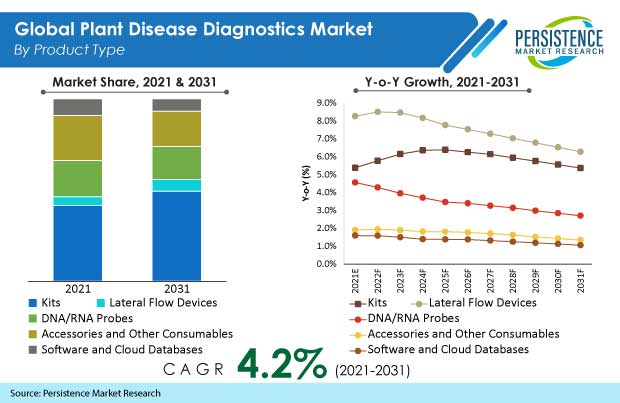3D Printing to Be the Buzzword of Plant Disease Diagnostics Market
As per Persistence Market Research’s latest industry analysis, the global plant disease diagnostics market was valued at US$ 88.8 Mn in 2020, and is expected to exhibit a CAGR of 4.2% over the forecast period (2022-2031).
According to a survey in Europe, around 16.5 million hectares of land was certified as organic in 2019. This included 430,000 organic producers and 82,000 organic processors. This estimate across Europe has doubled since 2006, and accounted for around 3.3% of the total agricultural area.
Get Free Sample Copy of this Report@ https://www.persistencemarketresearch.com/samples/32741
Agricultural biotechnology techniques are used to improve the quality of plants, animals, and microorganisms for specific agricultural uses. Based on the understanding of DNA, scientists have developed solutions to increase agricultural productivity. Starting from the ability to identify genes that may confer advantages on certain crops, and the ability to work with such characteristics very precisely, biotechnology enhances breeders’ ability to make improvements in crops and livestock. Biotechnology enables improvements that are not possible with traditional crossing of related species alone.
Rising importance of forest plantations increases demand for plant disease diagnostics. Several studies have been conducted to assess effective methods for early detection and identification of plant diseases in planting materials. New molecular genetic methods have been studied that can be used to screen forest trees for different pathogens to evaluate disease resistance.
With changing technology and advancements in agriculture research, cultivators are becoming more aware about advanced technologies to increase yield. Some service providers have developed their own detection and diagnosis methods, and most of them use readily available diagnostic kits to identify plant disease symptoms at an early stage so as to avoid destruction of entire crops and the spread of plant diseases.
- In January 2021, Agdia Inc. launched the ELISA reagent set for the detection of the tomato brown rugose fruit virus (ToBRFV). Compared to all other ELISA products on the market, it has higher sensitivity and specificity to the target pathogen.
- In January 2021, Agdia Inc. launched a rapid molecular assay to detect Dickeya spp. causing blackleg disease on potatoes.
- In June 2019, Agdia Inc. launched rapid molecular assays to identify the Goss’s wilt pathogen on corn.
Company Profiles:
- Thermo Fisher Scientific Inc.
- ClearDetections B.V.
- Merck KGaA
- Agdia, Inc.
- Qualiplante SAS
- LOEWE Biochemica GmbH
- BIOREBA AG
- PanonIT
- Agrisera AB
- Biosense Laboratories AS
- OptiGene Limited
- TwistDx Limited
Request for Methodology@ https://www.persistencemarketresearch.com/methodology/32741

Key Takeaways from Market Study
- In terms of product, the kits segment holds around 42.1% market value share globally. Growth is primarily attributed to technological advancements and developments in molecular diagnostic methods.
- Based on test, the serological test segment is leading with 57.2% market share. Specificity and accuracy in results are positively driving demand for plant disease diagnostics.
- Plants dominate the market by sample and account for approximately 39% share of the market. Several diseases are associated with entire plants, and hence, they are employed as a sample in several diagnostic procedures.
- Based on end user, agricultural laboratories dominate the market with a market share of 27.7%. This trend will continue as this segment projects considerable growth over the decade at a CAGR of 4.5%.
- By region, Europe dominates the global plant disease diagnostics market with a value share of around 40.7%. North America is the second-largest market with a value share of around 22.2%.
“Increasing crop losses due to plant diseases and changing climate are expected to drive market growth over the coming years,” says an analyst of Persistence Market Research.
Market Competition
New product launches and approvals, agreements, collaborations, and partnerships have emerged as the key growth strategy adopted by industry players. By focusing on these strategies, key stakeholders are expanding their geographic footprints and strengthening their existing product portfolios.
- In August 2021, Agdia Inc. released rapid isothermal assays for the detection of emerging pathogens in industrial hemp.
- In September 2021, the clinical sequencing division of Thermo Fisher Scientific and AstraZeneca announced that they would collaborate to develop next-generation sequencing (NGS)-based companion diagnostics (CDx) to complement AstraZeneca’s growing range of targeted medicines.
- In October 2019, Agdia Inc. released new immunostrips for the detection of the tobacco streak virus.
What Does the Report Cover?
Persistence Market Research offers a unique perspective and actionable insights on the plant disease diagnostics market in its latest study, presenting historical demand assessment of 2016 – 2020 and projections for 2021 – 2031.
The research study is based on the product (Kits [Elisa kits, DNA based diagnostics kits, protein based diagnostics kits], lateral flow devices, DNA/RNA probes, accessories and other consumables, software and cloud databases, test (molecular tests[PCR- based assays, PCR & RT-PCR, multiplex PCR], isothermal amplification assays[microarray assay, NASBA, the LAMP assay], serological tests [ELSIA,TBIA, QCMI], tests using electronic technology), sample (seeds, grains, plants, trees, fruits, others), end user(agricultural laboratories, academic and research institutes, food processing laboratories, contract research organization, others), across seven key regions of the world.
Access Full Report@ https://www.persistencemarketresearch.com/checkout/32741
Contact Us:
Persistence Market Research
Address – 305 Broadway, 7th Floor, New York City, NY 10007 United States
U.S. Ph. – +1-646-568-7751
USA-Canada Toll-free – +1 800-961-0353
Sales – sales@persistencemarketresearch.com
Comments
Post a Comment